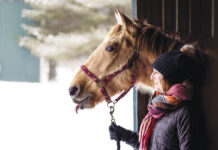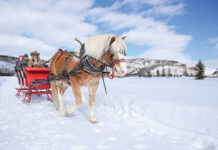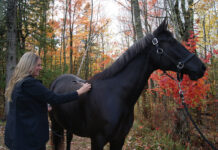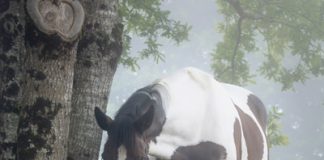Grief over the loss of a horse is never easy, especially when they are like family.
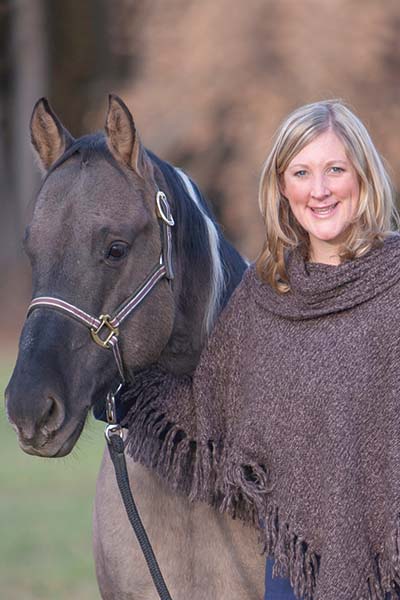
A moment ago, I’d hugged his sweat-soaked neck and looked down to see the droplets of red on my boots. The attempts to slide a tube through his nostrils didn’t relieve the pressure of this first-ever colic. Blood outlined his muzzle.
Q’s colon ruptured somewhere between our home and the veterinary hospital. Doctors swarmed him when he stepped off the trailer. But it was too late. Surgery wasn’t an option.
I remember the veterinarian’s words.
“He’s in pain. It’s best to put him down.”
I could only answer with a nod while unspoken questions swirled in my mind. Didn’t they know he was fine until yesterday?
In the padded room, I memorized the feel of hugging his neck. I gulped the word “goodbye.”
In the hall, my muscles failed me. Grief for my beloved horse took over.
Looking for Comfort
That was nine months ago. Since then, I’ve learned that no matter what type of love you’ve lost, it takes time to heal.
Here, I’ll share my thoughts about grief when it comes to losing a horse and hope my process may help others.
I first looked for comfort from books. Psychiatrist Elisabeth Kübler-Ross, M.D., author of On Grief & Grieving, outlines the five stages of grief we’re all familiar with: denial, anger, bargaining, depression, and acceptance.
“There is no typical loss. Our grief is as individual as our lives,” she writes.
For the equestrian perspective, I reached out to trainer Barbra Schulte, who writes about overcoming grief in her book, Healing Thoughts on Loss, Grief & Horses. I cried for her when I learned that she lost her son to cancer. Her advice?
“Be kind to yourself. Emotional pain is tough. Rest. Don’t force anything. You’ve put out tremendous mental, physical and emotional energy, and now it’s time to recover in all of those ways.”
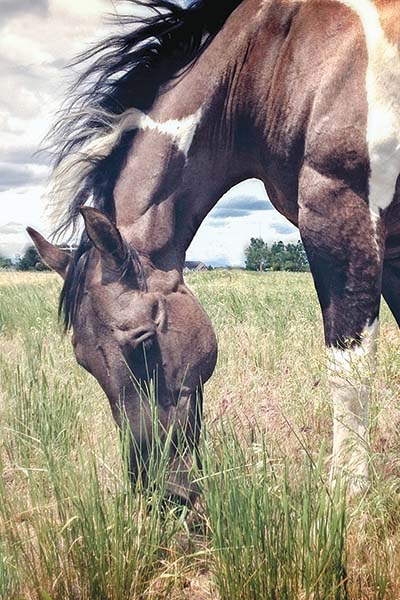
At first, I felt guilty sharing my loss of Q with Schulte. Shouldn’t I lessen my grief of a horse in the presence of her loss of a child?
“I believe every experience of grief is unique,” she explains. “That’s because the love, the relationship, the time spent together is always rich and beautifully personal. And for that reason, I don’t compare the two, because in both instances, we begin a new chapter here without the physical presence of the other. Because our greatest desire as a person is for love and connection, that’s why it’s so painful to lose those we feel most closely connected to—and that is both people and animals.”
With thoughts from Kübler-Ross and Schulte, I kept track of my own grieving. Here’s how the stages of grief related to losing my equine friend.
Denial
Kübler-Ross associates denial with surprise. Q wasn’t old. He had no previous problems. One day he’d be my daughter’s horse. I never thought of losing him—even as we arrived at the veterinary hospital.
I sometimes, though briefly, I forgot Q was gone. When my calendar app reminded me it was time to go to the barn, I jolted, thinking I should go immediately. I quickly remembered and deleted the reminders. I shed a tear each time I was shocked again.
Gradually, I didn’t expect to see him ambling in at feeding time. I imagined seeing him in the field, but I was no longer surprised. The process continued.
Anger
I was still angry that Q was gone. Though I consciously trust they did their best, I was angry that the veterinarians couldn’t save him. I was angry to receive bills for a horse that wasn’t alive. I had to acknowledge these feelings before I could move past this angry stage.
Journaling and music helped me turn my angry thoughts to something positive. Knowing I needed to forgive myself, I wrote the word “forgive” at the top of the page and wrote out all the things I needed to be forgiven for. Forgiving myself lessened my anger and helped me move on in the process.
Bargaining
The bargaining stage may be better named “the what-ifs.” What if we had gotten to the hospital sooner? The truth is that Q is gone, and nothing I can do will change that.
For me, this step blurred with anger. My what-ifs made me think of things I could have done differently. When I shared my “what-ifs” with my long-time veterinarian, she said that she and her partners had discussed possible causes for his fast-moving colic.
What if Q had a conformational predisposition that made it easy for his gut to twist? There were many possibilities. I had to stop asking “what if” and trust that it wasn’t my fault.
Depression
Kübler-Ross says that feeling depressed during grief isn’t a sign of mental illness. Instead, it’s the appropriate response to feeling a great loss.
Knowing that I needed time to process my feelings, I carved out an hour a day for myself. I walked, I spent time with our pony, I exercised. I called a friend who was willing to listen. I sometimes just stood and stared at Q’s stall and cried. I didn’t want to stay in sadness, but I knew I needed to feel my feelings before moving on.
During this time, I chose books that reminded me of how I wanted to feel. A friend recommended the book Girl, Wash Your Face. The title alone prompted me to wash up and face the day. The book is worth a read. Rachel Hollis’ willingness to talk about emotions she faced helped me face my own.
Acceptance
Soon I could remember the good times. I was thankful when I saw Q’s photo in online advertisements. I remembered chasing him around the pasture to get the galloping shots I needed. I remembered the day he saw my pregnant belly and just kept his head there.
I kept Q’s stall clipped closed for a month. I couldn’t make myself clean it out. Then one day, I returned from the store with cleaning supplies. I pulled back the mats, washed the walls with bleach, and scrubbed everything. In the middle of his clean stall, I stopped and sobbed.
For me, cleaning his stall meant that I knew he was gone from here but not gone from my memories.
Get the Help You Need
Seek out the therapies and stress-reducers that will help you. If you have a friend you trust, seek out time in their presence. If you feel better when you pray, schedule time. If it feels like too much, get help from a licensed medical professional. There is no shame in seeking help after losing an animal.
Schulte recommends seeking out support. “Seek time with those with whom you can just be you—the people who don’t require conversation unless you want to talk. I now know that part of the richness of life is to walk through the darkest times with special friends.”
This article about dealing with grief over the loss of a horse appeared in the October 2020 issue of Horse Illustrated magazine. Click here to subscribe!

